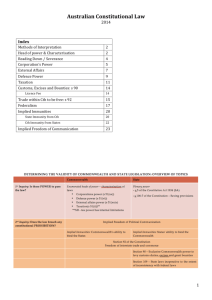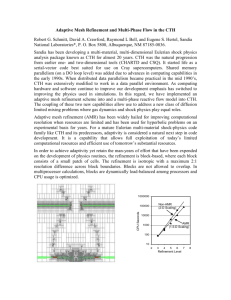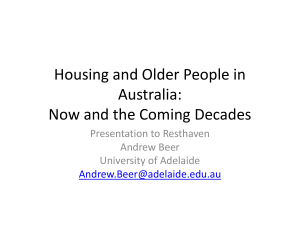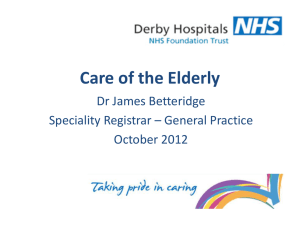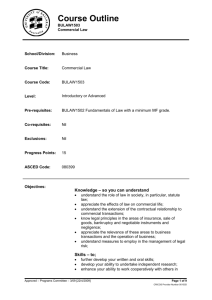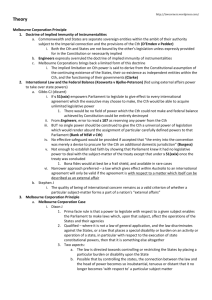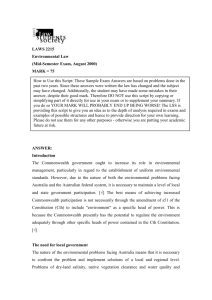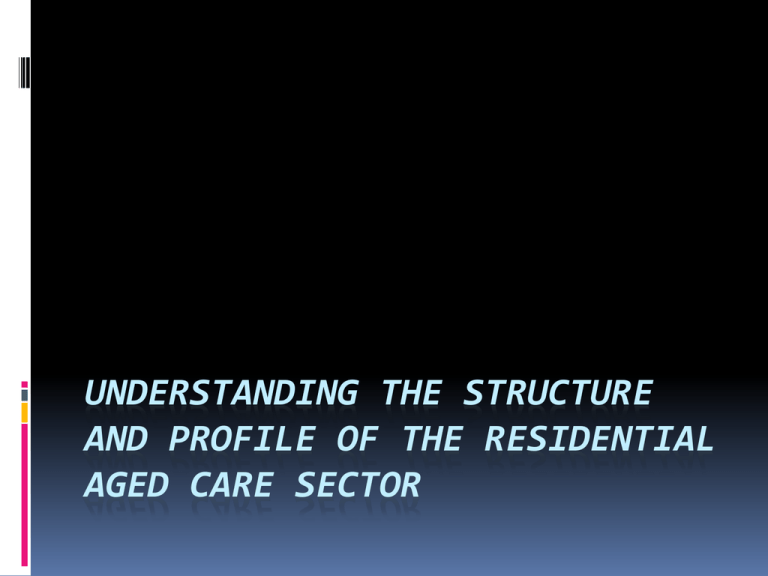
UNDERSTANDING THE STRUCTURE
AND PROFILE OF THE RESIDENTIAL
AGED CARE SECTOR
Understanding the issues facing
older people and their carers.
As a support worker, you need to understand
issues facing your clients and help them in the
best possible way. You must always be
tolerant and understand the individual needs
of your client.
Physical Changes.
People’s bodies change as they get older.
Muscles lose strength; bones break easily; lose
flexibility; may lose balance; sight and hearing
deteriorate; skin becomes thinner and can break
or tear easily; gain or lose weight; and general
fitness may decrease.
Support Workers can help older manage these
changes people by:
Encouraging older people to exercise
Watching for things that may make older people
trip or fall
Helping older people move around safely
Making sure aids used by older people work
Assisting older people to look after glasses or
contact lenses
Watching for changes in how older people move
Telling someone if there is a problem.
Cognitive changes:
Sometimes people find thinking more difficult as
they age.
Thought processes may be slower; find it harder
to remember names of people and places; may
forget what they did yesterday or where they
need to go; may lose their way; or could get
upset and angry.
Changes to an older person’s thinking may be
due to dementia, which causes progressive loss
of memory and thinking skills. However, not all
cognitive changes are due to dementia.
Support workers can help older people manage
cognitive changes by:
Writing reminder notes
Putting appointments on calendars
Talking about important details
Writing down names and phone numbers
Wearing name tags
Introduce themselves clearly
Participate in activities
Support workers should be aware of things that
upset their clients; it is also the support workers
responsibility to watch for changes in an older
person’s ability to think.
Older people may require more help if their
cognitive ability changes. It may not be safe for
them to stay at home. They may need someone
to watch them closely. They may need help with
more tasks. Support workers need to record
changes or problems and report these if there is
concern.
What are some of the social changes that an older
person may experience?
Did you list these?
Find it harder to socialise with friends; find it
harder to meet new people; older friends may
die or family may move away; getting out to
do things or staying in touch with people may
get harder.
What can support workers do to help older
people manage social changes?
Did you list these?
Encouraging phone calls to friends and family
Driving older people to activities
Finding out about social groups and activities
Helping older people write letters and emails
Talking with older people about photos
Respecting privacy.
Some older people may be upset about changes
to their social lives. They may become lonely and
depressed. However, just because they are
feeling a bit sad does not mean they are
depressed. There may be a good reason for
feeling sad. Depression must be assessed by a
doctor. A support worker cannot diagnose or
treat depression.
If you notice any changes in behaviour (sad,
sleeping a lot more) that worries you, talk to a
superviser.
Family Changes:
List the ways a family can change.
Did you list these?
Children grow up And have their own families;
people move away; people get busy with their
lives and may spend less time with an older
person; Family members may not like being
carers or find it hard to be; people may not have
the skills needed to be a carer; they feel
uncomfortable.
As families change, an older person may need
help from other places such as respite care,
which gives unpaid carers a rest by providing
care for a short time. Services like this can
help older people stay at home longer.
Watch “Discovering Psychology-Maturing
and Ageing” on ClickView
Help with personal care:
What kind of personal care help might an older
person need?
Did you list these:
Showering and toileting
Brushing teeth or shaving
Putting on makeup
Getting dressed
Helping older people with personal care tasks may
present difficulties because most people prefer
to look after their own bodies. Support workers
can help older people in lots of ways with their
personal care tasks. Always make sure you:
Ask what help is needed
Ask how the older person likes things done
Remember people are different
Are respectful and polite
Help private tasks to stay private
Check the older person is safe
Tell someone if there is a problem.
Task
Imagine you are talking to Mr Jenkins about his
personal care. You need to know how he likes his
personal care tasks to be done. Make some
notes about what you would ask him so you can
learn how he likes to:
Have his hair washed
Have his teeth cleaned
Get dressed.
Transport help
You will need to identify the client’s transport
needs. After doing this, you may need to:
Plan how you will get there
Work out long the trip will take
Arrange transport for the client
Drive the client yourself
Help them in and out of the car.
Always make sure you can d things safely.
Don’t take risks. If you are unsure about the
best way to get your client to their
appointments, check with your supervisor.
Loss and grief:
What is grief?
How or when might an older person experience
grief?
Grief is the sadness people feel when they
lose someone or something important to
them.
Reasons for experiencing grief: Partner is ill or
needs to move out of the home; partner may
die; family member/s might move away;
when older person loses skills they used to
have (eg, aren’t able to move as easily or lost
independence).
Support workers need to listen to their clients
so they know if they are sad or grieving.
Never make the client feel bad about their
feelings. Help them to be positive. Talk to
them about the friends and family they still
have. Remember, its okay to be sad
sometimes.
Task
1. Think of some of the signs of grieving.
We are going to brainstorm them on the board.
2. Complete the case study of Mavis and Archie.
Attitudes in Society.
Many people enjoy talking and being with older
people. They believe it is great having older
people in the community. However, others
think older people should stop work as soon
as they are 65 years old. They believe older
people should go into aged care homes when
they are old. Some people believe older
people cannot do all the things a younger
person can do.
Support workers should:
Encourage older people to continue doing
things that interest them.
Support older people to travel to social
centres
Explain to family members and others the
value of the older person participating in
activities.
Family carers:
Some families you will work with will be close.
They will want to be informed about the
wellbeing of their relative, and will want to be
involved in their care.
Other older people will not be close to their
families, they may not get along or even see
each other. Remember all older people are
different.
Some families may be upset if something
happens to their older relative, or if the
relative can’t do things. They may be worried
that they are getting sick, or they may not
understand what is happening or may not
even understand the care needs of the older
person.
Aged care support workers can help families by:
Remembering all families are different
Listening when families want to talk
Explaining changes simply and clearly
Not sharing private information
Suggesting respite care to give families a break
Making sure families get a real rest and time
away when providing respite care
Using the communication book to share ideas
with the family.
Knowing about aged
care laws and rules
Important laws and rules:
Aged Care Act 1997 (Cth)
State legislation
Residential care manual
Privacy Act 1988 (Cth)
Occupational Health and Safety Act 1991 (Cth)
Other relevant legislation
Aged Care Act 1997 (Cth)
This legislation applies to all services
including aged care homes, community care
services, transitional and respite programs.
This act provides guidelines for how care is
given and ensures quality service is provided
to older people by:
Ensuring everyone has equal access to care
Ensuring care is not refused due to someone’s:
Racial background or language
Lifestyle
Finances
Locality
Describing what aged care services need to do
Looking after people using aged care services
Giving respite to carers
Making sure there is a range of services to suit all needs
Helping older people enjoy the same rights as others
Helping people age where they want to (ageing in place)
The Aged Care Act is a legal document. Your
workplace will interpret the requirements of
this act in its guidelines, policies and
procedures. To ensure you are complying with
the requirements of this act, you must do
what your supervisor tells you and follow you
workplace policies and procedures.
State legislation
Task:
Search the ACT Health website
www.health.act.gov.au
Look for any policies relating to aged care
practice.
Note down what the document is called and
what it tells the worker to do, in general
terms.
Residential care manual
This book describes how the Australian
government (with help of the state
governments) expect aged care homes to be
run. It is based on the Aged Care Act 1997. It
explains who needs to do what in an aged
care home. It helps managers and workers
understand what the government wants. It
explains what people working in aged care
homes need to know.
Task
1. Using the internet, access the website:
www.health.gov.au.
2. In the search bar type: Residential care
manual
3. Choose the Australian governments
Residential care Manual for 2009-edition 1.
4. Choose the PDF file.
5. Choose a section of information that you
would like to know more about and
summarise the main points.
Privacy Act 1988 (Cth)
This legislation protects all personal
information handled by businesses. Attached
to this legislation are the ten national privacy
principles, which set the standard for
handling private information.
The national privacy principles relate to:
Collection
Use and disclosure
Data quality
Data security
Openness
Access and correction
Identifiers
Anonymity
Transborder data flows
Sensitive information
Occupational Health and Safety
Act 1991 (Cth)
The occupational Health and Safety Act 1991
(Cth) applies to all workplaces. This legislation
protects workers from injury or illness. The
act outlines the level of responsibility workers
and employers must take to ensure their
safety and the safety of others.
Other relevant legislation
Age Discrimination Act 2004 (Cth)
Home and Community Care Act 1985 (Cth)
Veteran’s Entitlements Act 1986 (Cth)
Disability Services Act 1986 (Cth)
Disability Discrimination Act 1992 (Cth)
Human Rights and Equal Opportunity
Commission Act 1986 (Cth)
Racial Discrimination Act 1975 (Cth)
Sex Discrimination Act 1984 (Cth)

